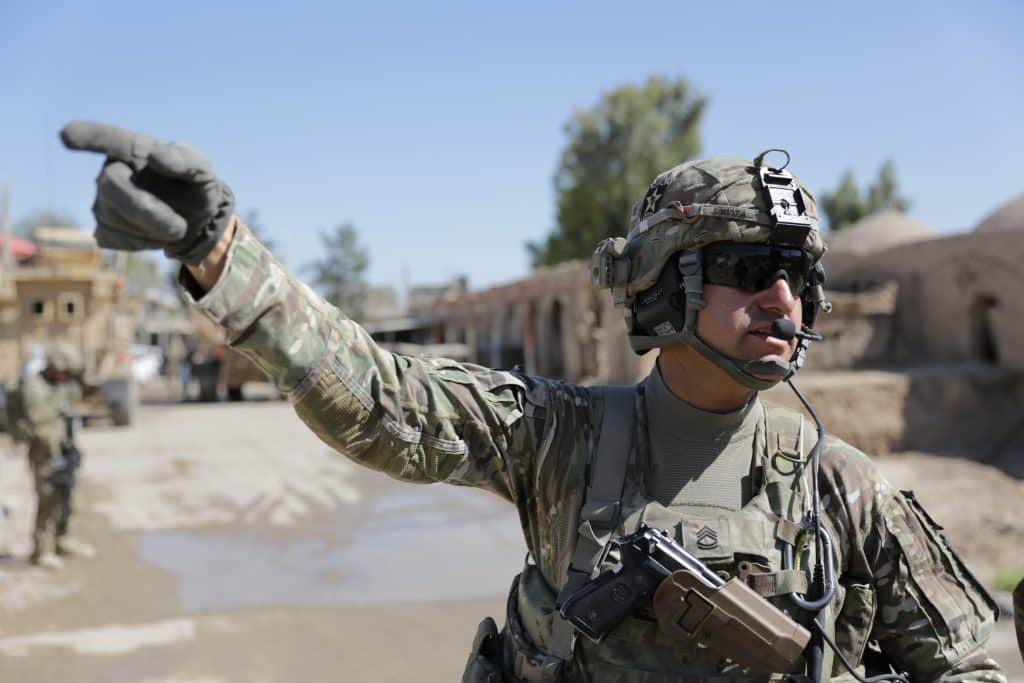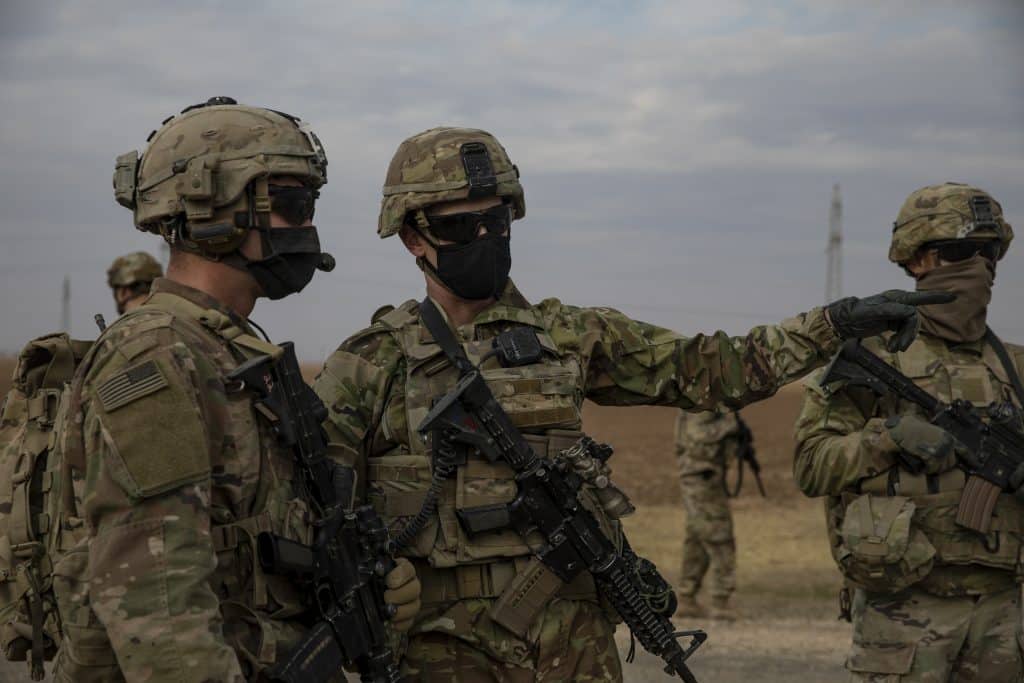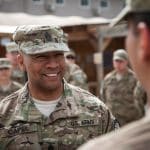by Master Sgt. Patricia Ledford, US Army
The United States (US) Army faces many challenges, including racism, extremism, sexual harassment, and suicide. These challenges pose a threat to the cohesion of units as well as the overall readiness of the force. Sergeant Major of the US Army (SMA) Michael Grinston and US Army Chief of Staff General (GEN) James McConville often highlight the US Army’s renewed focus on leader development and US Soldier care. Their efforts include the People First philosophy, the This Is My Squad initiative, and overhauls of US Army leadership publications which now address the corrosiveness of counterproductive leadership and explain how traits like empathy, humility, and resilience cultivate climates of trust (Department of the Army [DA], 2019a).
While the US Army faces issues related to American society’s discord, the US Army must prioritize national security by identifying ways to strengthen the relationship between its leaders and its US Soldiers. It is possible to achieve this goal by teaching key leadership attributes, the US Army Values, and the Warrior Ethos and demonstrating meaningful methods to develop leaders. According to research professor and author Brené Brown (2014), leadership characteristics such as empathy and humility are impossible without vulnerability. Vulnerability can be fatal on the battlefield. As GEN McConville once said:
Winning matters. When we send the United States Army somewhere, we do not go to participate; we do not go to try hard. We go to win. That is extremely important because there is no second place or honorable mention in combat. (Kimmons, 2019, para. 28).
US Soldiers refer to vulnerability in conflict when assessing and targeting centers of gravity for attack or defense (Department of the Army [DA], 2019b). US Army doctrine does not mention vulnerability regarding leadership or its impact on troops’ individual lives and performance. Nonetheless, recent research in organizational psychology and leadership studies suggests that leaders’ vulnerability is one of the most crucial factors in developing positive, innovative workplaces that encourage subordinate well-being. While teaching warfighters to embrace vulnerability may appear counterintuitive, the lesson is imperative. Vulnerability enhances the well-being of US Soldiers and restores trust within formations by helping to develop authentic, emotionally intelligent leaders.

Why Vulnerability?
Human beings, therefore, US Soldiers, have a powerful desire to connect, and their social behavior is the most complex and exciting of all animals (Sukel, 2019). Connecting gives life meaning and purpose (Brown, 2018). Connecting is impossible without vulnerability. It is where joy, love, creativity, and a sense of belonging derive (Sukel, 2019). Fear, shame, and a search for worthiness are at the core of vulnerability (Brown, 2018). Many people attempt to protect themselves against it by taking drastic measures. People use defense mechanisms to protect themselves when exposed, seen, and subjected to criticism (Brown, 2018). As a result of the attempt to numb the discomfort of vulnerability, addiction, obesity, debt, and broken relationships are frequently the result (Brown, 2018). People who face the discomfort of vulnerability can stop being whom they believe they should be and start living authentically.
The concept of vulnerability invokes images of crying and disclosing personal information (Sinek, 2009). It looks different in a professional setting. Vulnerable leaders create environments that promote innovation and are free of the burden of perfectionism (EntreLeadership, 2019). These leaders are self-aware, adaptable to change, listen to feedback, share success with others, and do not blame their subordinates for failures (Brown, 2018). An authentic leader is not afraid to admit defeat or make a mistake. When their subordinates make mistakes, they do not criticize them but instead use these opportunities to assist them in growing and learning. This type of opportunity encourages employees to take calculated risks, propose innovative ideas, and speak up when they observe anything unethical or dangerous (EntreLeadership, 2019). Vulnerability enhances leadership.
How Vulnerability Enhances Leadership
The US Army has recently emphasized humility as an essential component of authentic leadership. Having the right level of humility means being willing to learn, maintaining accurate self-awareness, and seeking feedback from others. A humble leader understands his or her limitations and applies that understanding to the tasks (DA, 2019a). Authentic leaders can make themselves vulnerable by utilizing self-assessment and self-awareness to identify their shortcomings (Horval, 2020). As a result, they adapt to a changing environment and realize the importance of caring for their people and accomplishing their mission (Horval, 2020).
An organization headed by an authentic leader experiences higher commitment versus compliance, job performance, job satisfaction, trust in leadership, psychological well-being, behavioral integrity, and perceived leader effectiveness (Horval, 2020). Authenticity in an organization requires humility and vulnerability rather than authoritarianism. Furthermore, individuals who work in organizations with authentic leaders tend to emulate these behaviors when they become leaders themselves (Horval, 2020). Authentic leaders build strong teams and are more emotionally intelligent.
Building Teams
According to the Noncommissioned Officer (NCO) Creed, NCOs should be aware of and prioritize their US Soldier’s needs above their own. Most NCOs do not realize that vulnerability accompanies their commitment and investment in others. When someone cares about something or someone to such an extent, he or she may be disappointed, may not receive a return on investment, and may not receive reciprocation (Brown, 2018). Relationships require a certain level of vulnerability. Only through this process can two parties establish trust (Sukel, 2019). Most leaders, however, train, coach, and mentor their US Soldiers, and those actions display vulnerability without them ever realizing it.
Further, while most leaders recognize how important it is to know their subordinates, fewer realize how crucial it is for their US Soldiers to know them. In the US Army, trust is the cornerstone of the profession (DA, 2019a). To develop trust, one must be willing to be vulnerable. Developing trust through the leadership philosophies, experiences, families, values, and personalities of a leader’s subordinates occurs when a leader shares his or her leadership philosophies, experiences, families, values, and personalities. Knowing and trusting each other facilitates the development of cohesive teams willing to work hard and sacrifice for the mission and one another. As the most lethal and effective fighting force on earth, the US Army relies on the camaraderie and love between its US Soldiers. However, these bonds would not be possible without vulnerability. Vulnerability leads to emotional intelligence leaders.

Emotional Intelligence
Goleman (2004) identifies empathy and organizational awareness as components of social competence in his work. In addition, he points out the importance of social skills, saying, “A leader without empathy is as good as not having it at all. And a leader’s motivation will be useless if he cannot communicate his passion to the organization” (Goleman, 2003, p. 91). An effective leader needs to sense how their employees feel about the work environment and intervene when they feel discouraged (Srivastava, 2013). Employees are likelier to stay with leaders with high emotional intelligence (Srivastava, 2013). Practicing social competence and being willing to expose oneself to repeated failure are vital in leaders.
Emotional intelligence also means managing one’s inner monologue, sometimes called self-regulating, which refers to how one reacts to their environment or situation. In other words, it is an aspect of emotional intelligence that allows us to be free from the shackles of our feelings (Goleman, 2001). As part of self-management skills, individuals must manage emotions, adapt to circumstances, succeed, and maintain a positive attitude (Brown, 2018). An organization’s leaders must be optimistic during times of transformation and turbulence. It is possible for leaders to be disappointed and wrong about outcomes when they wish for the best, but this vulnerability sets a tone for subordinates’ morale and outlook.
Lastly, emotional intelligence means having self-awareness. According to renowned psychologist Daniel Goleman (2001), a self-aware individual can identify feelings and understand how they affect performance. To foster self-awareness, one must be self-confident, realistic, and humorous (Goleman, 2001). Self-aware people recognize their limitations, ask for help when needed, and view failures as learning opportunities. In other words, self-awareness requires vulnerability. In Northouse (2018), self-awareness is not an end but rather a continuous engagement and evaluation process. Self-awareness is crucial to authentic leadership, but it is only helpful if a leader uses it as a blueprint for decisions and actions (Northouse, 2018). Using emotional intelligence, leaders can use vulnerability to help support US Soldiers.
How Vulnerability Supports US Soldiers
To accomplish a mission, the members of a team must develop trust. The US Army’s success is based on trust between its US Soldiers, their leaders, their subordinates, and the American public (DA, 2019b). There is no magical way to develop authentic leadership; it requires concerted efforts, an openness to constructive criticism, and a willingness to adapt to the organization’s needs (Horval, 2020). Leaders need to understand that their roles are not about being in charge but rather about taking care of and supporting the people under their care (Sinek, 2009). Supporting US Soldiers through breaking the stigma of behavioral health, having tough conversations, and allowing US Soldiers the freedom to fail leads to a better US Army.
Freedom to Fail
In his book, Failing Forward, Maxwell (2007) describes how great achievers develop resiliency by using failure as a catalyst. The author outlines seven principles for success in failing: reject rejection, do not point fingers, understand that failure is temporary, set realistic goals, emphasize strengths, change the approach, and bounce back after failure. Taking risks and attempting challenges more than once is necessary for US Soldiers to be able to put these principles into action. Micromanaging and tightly controlling subordinates’ decisions and actions indicate a lack of trust in the leader and others (Trimailo, 2017). When leaders refuse to accept the inherent vulnerability of risk-taking, they develop a cynical attitude (Brown, 2018). Furthermore, an environment lacking space for vulnerability and failure promotes lying, cheating, and other unethical behaviors (Trimailo, 2017).
Consider the potential benefit of US Soldiers knowing it is okay to receive a no-go on their first attempt at a task. Consider the anxiety they would avoid, and the confidence boost they might experience if they were not concerned with ridicule or reprisal. Despite the US Army doctrine prohibiting a no-fail environment, some leaders continue to demand perfection from their organizations (DA, 2019b). It is common for leaders to hold their US Soldiers to higher standards than they could achieve. This behavior stifles creativity, resulting in frustration and fear within an organization. Sinek (2009) asserts that fear is only a successful short-term motivator. Knowing that leaders care professionally and personally, coupled with trust and the opportunity to try new things, is motivational. Moreover, allowing US Soldiers to experience small failures early in their careers or during training can help prevent significant losses later when success is crucial. The lack of experience with high-stress environments or failure causes US Soldiers to feel paralyzed by fear or uncertainty and can lead to behavioral health issues and even suicide.

Suicide and Behavioral Health Stigma
In many cases, service members join the military to become team members and be part of something greater than themselves. Some individuals join the military in search of a family they have never been able to find as civilians. Even though many US Soldiers benefit from their connection with their leaders and comrades, some do not. In calendar year (CY) 2021, the US Army lost 519 US Soldiers to suicide, and preliminary data from CY 2022 reflects 22% and 25% increases in the third and fourth quarters, respectively (Department of the Army, 2022). Several factors contribute to suicide, including a sense of thwarted belongingness and burdensomeness (Joiner, 2005). Suicide results from the lack of connection with others and the shame associated with making their lives more difficult; US Soldiers frequently feel embarrassed or ashamed to seek behavioral health treatment because they fear they will appear weak. They fear vulnerability. There is a feeling of unworthiness.
At a conference in October 2020, SMA Grinston explained, “We have not convinced you at the junior level that it is okay. Going to say it again, it is okay to go to behavioral health” (Pihulic, 2020, para. 4). Senior leaders need to make comments like these to normalize vulnerability in troops. It is even more powerful for US Soldiers to hear that their unit-level leaders understand their personal and professional challenges. Their leaders perpetuate the perception of perfection among US Soldiers by failing to share their failures and struggles. Leaders may correct these misperceptions tactfully and professionally without disclosing personal details. In the absence of vulnerability, a leader’s subordinates will not be able to be vulnerable either (Sinek, 2009). An individual’s authenticity is not determined by what they are born with but by what they choose (Sinek, 2009). Having tough, authentic, and sometimes vulnerable conversations can get ahead of behavioral issues.
Tough Conversations
US Soldiers must have tremendous courage and vulnerability to report sexual harassment or assault incidents to their chain of command. Leaders, US Soldiers, and the entire nation have been horrified by the findings of an independent review committee regarding Fort Hood’s mismanagement of its Sexual Harassment/Assault Response and Prevention Program (SHARP). Fort Hood’s recent highly publicized failures warned US Army leaders at all levels that the name The Great Place may no longer be appropriate.
The Report of the Fort Hood Independent Review Committee (2020) revealed structural flaws in the US Army’s SHARP and the incompetence of individual leaders in this case. Additionally, it revealed the importance of developing the whole person and helping every Soldier understand the value of the warriors with whom he or she serves (Fort Hood Independent Review Committee, 2020). Traditional military training focuses more on managing misconduct and minimizing its effects than developing service members who can uphold standards and respect one another. Leaders must prepare to support US Soldiers in displaying the vulnerability necessary to bring sexual predators to justice through a system that protects and honors their bravery if they ask or encourage them to do so.
As meaningful, vulnerable conversations about race can lead to better relationships between leaders and the US Solider they lead. During the summer of 2020, protests and riots broke out all over the US following George Floyd’s death, which occurred while he was in the custody of a white police officer. As part of Project Inclusion, SMA Grinston and other senior US Army leaders began traveling the country to promote increased racial understanding (Cox, 2020). As a biracial son of a black man and a white woman, the SMA’s struggle with his racial identity was the initiative’s most significant and meaningful moment (Cox, 2020). All over the US Army, US Soldiers began to share their experiences with racism and biases and their struggles with identity and ethnicity. As a result of SMA Grinston’s courage and vulnerability, leaders were more comfortable starting the conversation with their US Soldiers.
Conclusion
Combat conditions cause US Soldiers and leaders to view vulnerability as a weakness. However, utilizing vulnerability as a leadership attribute contributes to the development of authentic leaders, promotes the well-being of US Soldiers, and strengthens the bonds of trust between leaders and their troops. Considering the increasing challenges confronting US Army formations, an innovative approach to connecting with US Soldiers and developing them is necessary and long overdue. There is no point in fostering no-fail environments or pretending to be perfect if the leader cannot convince US Soldiers that they care about the organizations’ and US Soldiers’ needs. Genuine leaders will undoubtedly experience loyalty and support from their members if they exercise tempered vulnerability. It is more likely that their US Soldiers will seek assistance when they require it and will demonstrate the personal courage necessary to engage in tough but necessary discussions when necessary. GEN Colin Powell (2012) once said:
Leadership is solving problems. The day Soldiers stop bringing you their problems is when you stop leading them. They have either lost confidence that you can help or conclude you do not care. Either case is a failure of leadership (p. 92).
The leadership problem-solving process in today’s US Army has reached a crisis point. Despite the increased use of technology in the military, authentic bonds of trust and vulnerability are lacking or nonexistent. Therefore, leaders must strive harder than ever to reach their US Soldiers and ensure they know they are there for them.

References
Brown, B. (2018). Dare to lead: Brave work. Tough conversations. Random House.
Cox, M. (2020, September 2). Army enlisted leaders open up about personal struggles with racial identity. Military. https://www.military.com/daily-news/2020/09/01
Department of the Army. (2019a). Army leadership and the profession. (ADP 6-22). https://armypubs.army.mil/epubs/DR_pubs/DR_a/pdf/web/ARN20039_ADP%206
Department of the Army. (2019b). Mission command. (ADP 6-0). https://armypubs.army.mil/epubs/DR_pubs/DR_a/ARN18314-ADP_6-0-000- WEB-3.pdf
Department of the Army. (2022). Quarterly suicide report: 3rd quarter: Calendar year: 2022. https://www.dspo.mil/Portals/113/Documents/2022QSR/TAB%20A_20221229_OFR_R
EntreLeadership. (2019, June 10). The power of vulnerability – Patrick Lencioni [Video]. https://www.youtube.com/watch?v=pbWEDk8fbBU
Fort Hood Independent Review Committee. (2020). The report of the Fort Hood independent review committee. https://www.army.mil/e2/downloads/rv7/forthoodreview/2020-12
Goleman, D. (2001). An EI-based theory of performance. In C. Cherniss & D. Goleman: The emotionally intelligent workplace (pp. 27-44). San Francisco, CA. Jossey-Bass. https://www.eiconsortium.org/pdf/an_ei_based_theory_of_performance.pdf
Goleman, D. (2003, December 31). What makes a leader? Harvard Business Review. https://hbr.org/2004/01/what-makes-a-leader
Horval, S. (2020, March 27). Authentic leadership. NCO Journal. https://www.armyupress.army.mil/Journals/NCOJournal/Archives/2020/March/Authentic
Joiner, T. (2005). Why people die by suicide. Google Books. https://books.google.com/books?hl=en%26lr=&id=YqN
Kimmons, S. (2019, October 8). New Chief of Staff: Taking care of people is key to winning the fight. US Army. https://www.army.mil/article/225377/new_chief_of_staff_taking_care
Maxwell, J. C. (2000). Failing forward. Harper Collins Leadership.
Northouse, P. G. (2018). Leadership: Theory and practice (6th ed.). Sage Publications.
Pihulic, M. (2020, October 1). SMA discusses mental health, racial issues at fires conference. US Army. https://www.army.mil/article/239594/sma_discusses_mental_health_racial
Powell, C. (2012). It worked for me. Harper Collins.
Sinek, S. (2009). Start with why. Penguin.
Srivastava, K. (2013). Emotional intelligence and organizational effectiveness. Industrial Psychiatry Journal, 22(3). https://www.industrialpsychiatry.org/temp/IndPsychiatry
Sukel, K. (2019, November 13). In sync: How humans are hard-wired for social relationships. Dana Foundation. https://dana.org/article/in-sync-how-humans-are-hard-wired-for-social
Trimailo, T. (2017). Epic fail: Why leaders must fail to ultimately succeed. Military Review, 9(6), 94–99. https://www.armyupress.army.mil/Portals/7/militaryreview/Archives
_________________________
This first appeared in The Havok Journal on April 21, 2023.
MSG Patricia Ledford joined the U.S. Army in July 2000 as a Combat Medic. She has served across Europe, Asia, and the U.S. in duty positions that range from Army Recruiter, Clinical Operations Segreant, Operations Sergeant Major, First Sergeant, and numerous staff positions. MSG Ledford holds a master’s degree in business and is currently a student at the U.S. Army Sergeants Major Academy.
As the Voice of the Veteran Community, The Havok Journal seeks to publish a variety of perspectives on a number of sensitive subjects. Unless specifically noted otherwise, nothing we publish is an official point of view of The Havok Journal or any part of the U.S. government.
Buy Me A Coffee
The Havok Journal seeks to serve as a voice of the Veteran and First Responder communities through a focus on current affairs and articles of interest to the public in general, and the veteran community in particular. We strive to offer timely, current, and informative content, with the occasional piece focused on entertainment. We are continually expanding and striving to improve the readers’ experience.
© 2024 The Havok Journal
The Havok Journal welcomes re-posting of our original content as long as it is done in compliance with our Terms of Use.



